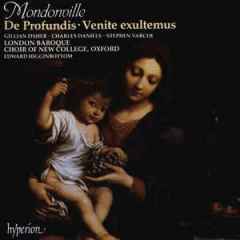Mondonville - De profundis & Venite, exultemus (Higginbottom) [1988]
Mondonville - De profundis & Venite, exultemus (Higginbottom) [1988]

Venite, Exultemus 1 Venite, Exultemus 3:38 2 Quoniam Deus 1:06 3 Quoniam Ipsius 3:00 4 Venite, Adoremus 2:44 5 Quia Ipse Est Dominus 1:01 6 Hodie Si Vocem 2:53 7 Sicut In Exacerbatione 2:55 8 Quadraginta Annis 3:05 9 Gloria 4:41 - 10 Regna Terrae 5:36 11 In Decachordo Psalterio 4:52 De Produndis 12 De Produndis Clamavi 3:24 13 Fiant Aures 2:47 14 Quia Apud Te 4:44 15 A Custodia 2:04 16 Quia Apud Dominum 2:29 17 Et Ipse Redimet 2:25 18 Requiem Aeternam 4:45 - 19 Benefac Domine 3:46 London Baroque Edward Higginbottom - conductor
Jean-Joseph Cassanéa de Mondonville (1711-1772) was one of the most gifted composer-violinists of his day, regarded by some to be the equal of Rameau. Though born and bred in Narbonne, he was soon drawn to Paris where his brilliant playing found early recognition. In 1740 he was appointed sous-maître at the royal chapel. From this time dates also a close association with the Concert Spirituel (of which he was for a period artistic director and first violinist). It was here that the works on this recording were first heard. Roberte Machard has calculated that between 1740 and 1762 there were no fewer than sixty-one performances of the grand motet Venite, exultemus and, between 1748 and 1762, forty performances of De profundis. This degree of popularity was accorded otherwise only to the grands motets of Delalande. Although Mondonville was active also as a dramatic composer, it was probably his sacred vocal and instrumental music that won him the greatest acclaim.
By the time that Mondonville came to write his grands motets, the tradition established by Lully and Delalande had run through almost two generations. But this French form of sacred cantata had not greatly changed in external characteristics; it remained a sequence of varied movements for soloists, choir and orchestra using a sacred Latin text, very often drawn from the Psalms. As for its internal organisation, Mondonville reflects changes that were already abroad in the Cauvin versions of Delalande’s scores where the old five-part string texture gives way to a more Italianate three- or four-part scoring. Mondonville’s texture is in fact a tre, omitting violas altogether. Nevertheless, the use of divisions, and the retention of the traditional five-part chorus (soprano, hautecontre, tenor, baritone, bass), produces the old opulent sonority for the tutti numbers. In the solos Mondonville clearly seeks a more progressive treatment, with lighter textures, often highlighting woodwind solos. Typically, he omits brass and percussion, relying on flutes, oboes and bassoons for colouring. A reading of the score easily gives the impression of a lightweight composer. But as so often with French music, appearances are deceptive. Mondonville is extraordinarily adept at achieving striking and noble effects with the minimum of resources.
Venite, exultemus is a brilliant vehicle for the three soloists, requiring a radiant soprano, a virtuoso hautecontre (high tenor), and an heroic bass. There can be few happier beginnings to a Venite setting, and the central triptych of movements featuring soprano with obbligato flute and oboe, followed by the hushed choral entry of ‘Adoremus’, is truly inspired. If emotionally the Venite turns on the contribution of the soprano, the hautecontre has a complementary role centring on a dazzling display of vocal agility. The final chorus, ‘Gloria Patri’, has its place in the order of things, choral virtuosity taking the floor with aplomb, French manners bowing out to Italian technique.
Not surprisingly, De profundis is a more restrained affair, relying more on the chorus. Mondonville begins with a solemn orchestral gesture, evoking with noble simplicity the sense of the text, and making respectful reference to Delalande’s own setting of these words in the descending triads of the bass before the first vocal entry. The following movements continue in a distinctly French rather than Italian style: ‘Fiant aures’ is a chaconne with descending tetrachord bass, but freely treated; ‘Quia apud te’ a gracious air; ‘A custodia’ a nimble gavotte; and so on. The final movement strikes a rather different note, the opening bars reminding one of nothing so much as Berlioz, with stark contrasts of scoring between low and high voices, and a prominent independent bassoon line. The final fugue at ‘Et lux aeterna’ returns to a fruitful synthesis of French and Italian styles, the entries (from top downwards) opting at times for the harmony of an interrupted cadence – an audacious gesture which generates considerable momentum, and a magnificent ending.
Whilst Mondonville’s grands motets stand in direct line of succession from those of Delalande, his petits motets represent a rather new way of conceiving the solo motet. These pieces have nothing to do with the tradition of petits motets exemplified in the works of Nivers and François Couperin. They stem rather from the ‘pièce en concert’ for harpsichord, in which sometimes quite optional instrumental parts are added to a self-sufficient harpsichord texture. Notable examples in this genre are the ‘pièces de clavecin en concerts’ of Rameau. Thus Mondonville in his printed collection of Pièces de clavecin avec voix ou violon (Op 5), published in 1748, provides the harpsichordist with nine extended pieces which might be played as solos, but which for their full effect involved also a soprano voice, and indeed a violinist. As in his grands motets, Mondonville consciously follows now a French and now an Italian manner. In decachordo psalterio is the most thoroughgoing exercise in the Italian vein, with the voice treated purely instrumentally. The ‘Cantate Deo’ section of Regina terrae and Benefac Domine are both more lyrical, the French rondeau form underpinning a predominantly vocal style. These petits motets very probably formed part of the regular programmes of the Concert Spirituel along with Mondonville’s grands motets. ---Edward Higginbottom, hyperion-records.co.uk
download (mp3 @320 kbs):
yandex 4shared mega mediafire zalivalka cloudmailru uplea ge.tt








